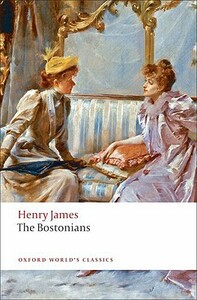Take a photo of a barcode or cover
emotional
reflective
sad
tense
fast-paced
Plot or Character Driven:
Character
Strong character development:
Complicated
Loveable characters:
No
Diverse cast of characters:
No
Flaws of characters a main focus:
Yes
The more compelling read of this: James shows how traditional gender norms, while abhorrent reinforcers of destructive ideologies, hold so much sway as to ruin the life and happy career of an agreeable young woman. Less compelling: James had a fantasy about the worst person he could imagine (a Confederate who shared James’ prejudices) wooing away one of the Vestals of the suffrage movement, reinforcing how weak-willed women oughtn’t be agitating for political equality.
This is my least favorite James novel so far. I realize it's meant to be satirical, but it was just a little too absurd.
I have thoroughly enjoyed many other books by Henry James (The Portrait of a Lady and Daisy Miller to name a few). Sadly, I found The Bostonians to be a bit dull. The premise of the story is intriguing, a poor woman (Verena Tarrant) is essentially adopted by a wealthy woman (Olive Chancellor) and taught how to speak more effectively for the cause of women's suffrage. Basil Ransom, Olive's cousin is strongly against suffrage and manages to corrupt Verena's views (which may have never been hers to begin with). He convinces her to betray Olive in the end,deserting the movement to marry. The story was dull in execution and I found myself angry that Verena was so easily swayed by both Basil and Olive. While she stood for a movement, she was simply a pawn who did what was easiest until she had to make a decision between the status quo and running off with Basil. The climax of the story could not even hold my attention and I was relieved to reach the final page.
Gave up half way thru - I couldn't force myself to continue when I had no interest in any of the characters.
If there were ratings for negative stars, I would accord several of them to this "novel." The one redeeming quality of it was the discussion of it at book club.
There is a lot of humor in Henry James's early novels, but I was blown away by how consistently hilarious The Bostonians is. No one emerges from this blistering, ambivalent satire clean: Olive's controlling, all but openly sexually possessive treatment of Verena makes a fetish object of a young woman whose commitment to the feminist cause is clearly influenced by her nature ability and desire to reflect the opinions of those around her; Basil Ransom is a repellent chauvinist whose casual sense of entitlement and patronizing belief in the rights of women to serve men subtly suggests that the debased Southern planter wishes to supplant one kind of slave with another. Even Verena, with her tendency to somehow be agreeable and pliant in an argument, comes across as a naïf whose gift for memorization and performance barely masks a lack of underlying wisdom and understanding. And that's not to mention the absolute menagerie of goofball side players, from Verena's snake-oil mystic father to a Boston gossip columnist who occasionally bursts through the middle of a scene like a truffle pig attempting to root out some inane tidbit of the upper class to share with his avid readers.
Still, as much as James clearly does not endorse or particularly take seriously the suffragist movement, this novel seems less an attack on feminism specifically so much as the liberal pieties of the idle rich who drift from cause to cause. An early aside about Miss Birdseye, the kindly but useless matriarch of Boston's various charitable associations, mentions her earlier work as an abolitionist and her subconscious nostalgia for the days when black people still lived in chains and she felt like she was contributing. In a single parenthetical, James lays waste to the entire enterprise of wealthy patronage of worthy causes; it's a line you could lob at a 19th-century benevolent aristocrat as easily as you could Bono. And though Basil gets the last word, James makes it clear what a rotten figure the man is by inhabiting his mental space, and the parting line beats the instant regret of romantic victory of The Graduate to the punch by 80 years. Rather, James writes in the ambivalent, character-focused style of The Portrait of a Lady, more interested in letting his characters' contradictions and flaws play out in messy, erratic patterns than to streamline them into an overriding moral view. In its own way, the novel is as impressively structured and daringly experimental as its canonical predecessor, albeit in the service of mordant comedy over anguished drama.
Still, as much as James clearly does not endorse or particularly take seriously the suffragist movement, this novel seems less an attack on feminism specifically so much as the liberal pieties of the idle rich who drift from cause to cause. An early aside about Miss Birdseye, the kindly but useless matriarch of Boston's various charitable associations, mentions her earlier work as an abolitionist and her subconscious nostalgia for the days when black people still lived in chains and she felt like she was contributing. In a single parenthetical, James lays waste to the entire enterprise of wealthy patronage of worthy causes; it's a line you could lob at a 19th-century benevolent aristocrat as easily as you could Bono. And though Basil gets the last word, James makes it clear what a rotten figure the man is by inhabiting his mental space, and the parting line beats the instant regret of romantic victory of The Graduate to the punch by 80 years. Rather, James writes in the ambivalent, character-focused style of The Portrait of a Lady, more interested in letting his characters' contradictions and flaws play out in messy, erratic patterns than to streamline them into an overriding moral view. In its own way, the novel is as impressively structured and daringly experimental as its canonical predecessor, albeit in the service of mordant comedy over anguished drama.
slow-paced
This book was so slow and the writing incredibly hard to read. At points I did enjoy reading about parts of New York and Boston but that was the only redeeming quality
emotional
reflective
slow-paced
Plot or Character Driven:
A mix
Strong character development:
Complicated
Loveable characters:
Complicated
Diverse cast of characters:
Complicated
Flaws of characters a main focus:
Yes
The worst. The worst book. The worst characters. The worst plot. I held out hope through this long, boring, overly-wordy book someone would make a good choice. Alas. It makes me mad just thinking about it.




